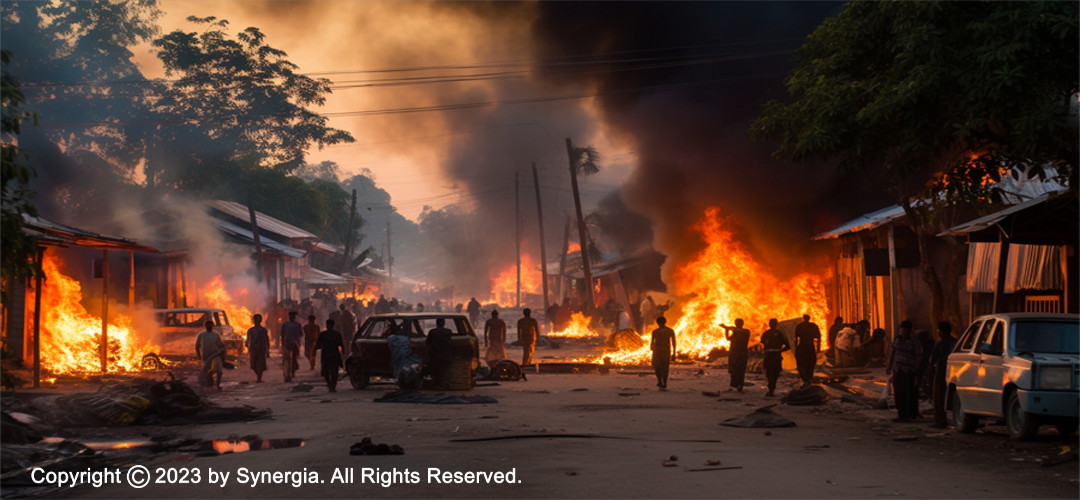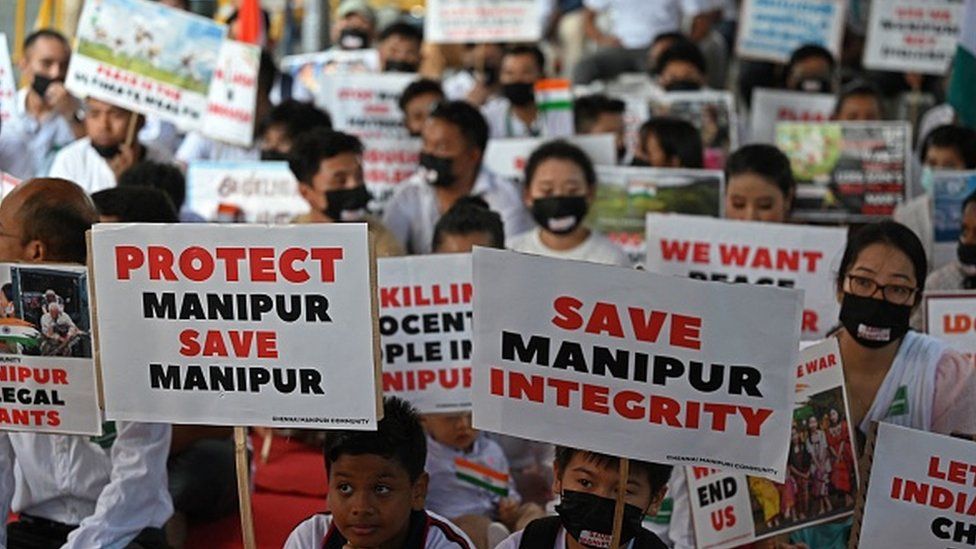Manipur: Running Out of Hope?
July 15, 2023 | Expert Insights

The “Jewel Land” Manipur, and the birthplace of polo, is in serious turmoil wreaked by over two months of unceasing violence claiming hundreds of lives and disrupting the lives and livelihoods of millions of its inhabitants.
Even more worryingly, there are indications that the sustained level of violence has both internal and external dimensions with serious consequences for India and its immediate neighbourhood.
India is in a tough neighbourhood with unsettled areas on its Eastern peripheries, stretching well into Southeast Asia. The Indian NE States are the country's first line of defence, and their weakening should seriously concern New Delhi. Trouble attracts those who like to fish in troubled waters, and India has many such neighbours and their proxies.
Background
The North-East region has always been geo-strategically significant for India.
The region is a connecting node for India with SE Asia and is the potential base for its Look East policy. The economic possibilities of the region itself are endless. It is blessed with a variety of natural resources, including a huge potential for tourism that remains largely untapped due to decades of insurgency and general neglect.
The conflict began when the Meitei’s demanded Scheduled Tribe status from a court order. This angered the Kukis, and they hit back. The central government has intervened. This has not produced any results yet. The Kukis are demanding a separate state for themselves within the Indian Union. The Meitei’s are not willing to compromise under any circumstances, least of all letting go of any territory to satisfy their sworn enemies, the Kukis.
Lt Gen DS Hooda (Retd), writing in the Indian Express, claims that there are many immediate triggers for the ongoing clashes — land rights, anti-poppy drive, illegal immigration, the Manipur High Court directive on Scheduled Tribe status for the Meitei community, etc. These are all significant issues warranting attention, but unless the fundamental character of the ongoing ethnic conflict is understood, finding optimal solutions will remain elusive.
The origins of this conflict do not just lie within the state of Manipur. The state shares a border with the neighbouring country of Myanmar. This country is currently going through an extremely violent civil war. Rebel groups are fighting against the government. Refugees are flowing into Manipur. A large number of the refugees are Kuki, and Kuki rebels in Myanmar are receiving support from their brethren in Manipur and vice-versa.
From this, it is quite obvious that this is as much a cross-border issue as it is an ethnic conflict. Myanmar's government is an international pariah. It has already faced censure from the world for its treatment of the Rohingya Muslims. Here also, India has been affected negatively. Hence engagement with Myanmar on these issues is of paramount importance for the Indian government.

Analysis
While successive governments in New Delhi would blame the region's remoteness and poor connectivity, stepmotherly treatment of the 'seven sisters' of India's Northeast would be an accusation hard to defend against. In the last few decades, many initiatives have been launched to fully integrate the Northeastern states of India with the mainland through enhanced connectivity by road, rail and rivers, much remains to be done to encourage investments in the eastern states.
New Delhi has to look at the Northeast from a perspective over and above its security concerns regarding internal and external threats emanating from this region of India. It is about time that the focus shifts from security to economic growth and improved governance to subdue the sense of neglect that the people of the Northeast have rightly experienced for the last seven decades of independence.
The internal ethnic dimensions of Manipur, like other Northeastern stats, are a complex jigsaw puzzle that defies an easy solution. Any one way out of the quagmire leaves either one or all the parties dissatisfied, angry and resentful. The mutual suspicions are so intense that one tribal segment will gladly let go of an opportunity if it also benefits the traditional rival tribe. In such a poisoned atmosphere, amicable solutions are hard to arrive at.
Ethnic suspicions have generally been high in the Northeast. The anti-Bengali campaign which took place in Assam once upon a time is a stark example of this. Tribal affiliation trumps any other identity.
The current unrest in the state of Manipur is not just a simple tribal conflict. It is much more than that. This conflict has regional and global implications. This could spread to the wider Northeast if not nipped in the bud. Boundaries are not drawn exactly in this region. So, ethnic groups overlap between states. Hence the chances of contagion are high.
In light of this, the central government's policy needs to change. Just forcing the two sides to talk with each other will not work; the underlying issues must be addressed. Grievance redressal is the first step in this process.
The Meitei and Kuki population are already living separately in Manipur. As a result, any demand for establishing a new state must be considered carefully. The Kukis will naturally like a state where they can live on their own. But will it solve the basic conflict? Won’t it create new complications? All these questions must be addressed before even considering a decision in this regard.
Instability in the Northeast is not good news for India in any way. Past conflicts in this region took a heavy toll on life and property. This includes both the local population as well as state and central forces. Over the last few years, a new dawn has emerged in this region. Economic development has taken precedence over tribal angst. All this is being threatened now if this conflict continues to escalate.
Before any peace process begins, the killings must stop. This will not happen automatically. Some proactive steps need to be taken by both the state and central governments. The large cache of weapons on both sides has to be confiscated. Disbandment of armed groups is necessary. These are some of the few initial confidence-building measures which should be taken. Only then can a conducive environment for talks be developed. This is not going to be an easy process. As conflict resolution in many other unstable areas has demonstrated, there are no simple answers. Both sides have to compromise. For this, the government must consult experts who have experience dealing with this kind of civil unrest.
Right now, this is still an inter-ethnic fight. Arms have not yet been turned against the state. But this could change in a moment. Then it will become an insurgency problem. This will be much more difficult to resolve. Nefarious foreign powers will definitely take advantage of this. Before this eventuality arises, the government has to bring about some kind of solution.
India is already facing severe pressure due to the Rohingya refugee crisis. On top of this, this conflict has created a new refugee crisis. Both Kuki and Meitei refugees have fled to other parts of the country. This is putting a huge strain on the system.
The conflict is damaging India’s reputation in the outside world. The US Ambassador to India has made unwarranted comments on this issue. This created a brief diplomatic situation which was resolved.
The foreign media is trying to portray this as a Hindu versus Christian conflict. Al Jazeera ran a web article claiming that “The rest of India is uninformed about what is really happening in Manipur though this is a national issue. It is being projected as a dispute between two communities, but it seems to be politically motivated.” The tone of the article highlighted the plight of only one community, totally ignoring that there is immense suffering on the other side, too. The Economist ran an article claiming that Manipur is "entering its third straight month of internet blackout" mocking India's claim to be an aspiring digital superpower.
Even worse, some segments of the foreign media, playing the tune of some vested elements in the strife-torn state, are trying to create an image to the international community that somehow some kind of state-sanctioned ethnic cleansing is going on in Manipur. This is a serious piece of misinformation that could seriously harm India's reputation as a responsible, stable and liberal democratic state.
Assessment
- The North-East is a major connecting point for India’s Act East Policy. Its geographical location makes it an attractive destination for both domestic and foreign, especially in tourism and manufacturing. But for this, peace is a prerequisite, and this must remain the priority for the government. Rehabilitation and mending bridges of inter-tribal relations could follow.
- The longer the ethnic bloodletting and arson continue, it will increasingly come under the scan of the international community. This will allow India's legion of enemies to target India's secular fabric and integrity.
- A possible solution lies when saner minds within the impacted communities sit with central negotiators empowered to make credible proposals to look at the basic cause- the contestation over land rights and its resources between a rising population trapped in a relatively small piece of real estate. If the growing militarisation of the civilian population is controlled, and the state also reduces its stark military footprint, some kind of consensus could hopefully be reached.








Comments